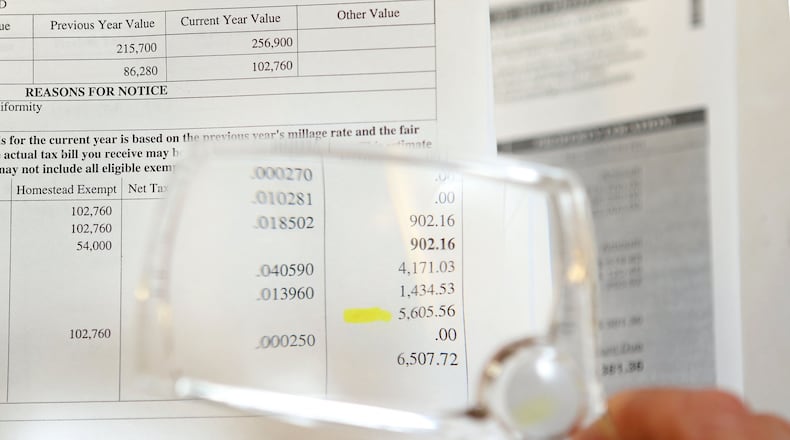Assessment appeal tips
- A lower property assessment will result in a smaller tax bill.
- Research what similar homes sold for last year to find out if you have a case.
- Consider using price per square foot as a way to make an argument that your home's assessment is too high.
- The appeal process is free, but professional property assessment appeal experts also can be hired to assist.
- The deadline to appeal is in July in most metro Atlanta jurisdictions.
- Appealing to a county Board of Equalization freezes your home's assessed value for the next two years, preventing increases during that time.
Just because the government says your home gained value doesn't necessarily mean you will have to pay higher taxes.
I was among those hit with a giant increase in my property assessment last year, but I appealed and won.
You, too, could save hundreds of dollars by appealing the county’s estimate of how much your home is worth.
All it took to lower my tax bill was an internet connection, a spreadsheet program (like Microsoft Excel) and an understanding of how to submit a strong appeal. Of course, you have to prove that the county's assessment was too high.
When my annual assessment notice arrived, I opened it to find the county had determined my home was worth 48 percent more than the previous year.
That was a tough increase to swallow, though in fairness, the government's assessment wasn't too far out of line with what homes in my Decatur neighborhood were fetching on the open market. Still, the assessment was high, and I thought I could do better.
Using knowledge gained from tax experts who spoke at town hall meetings, I got to work.
The key was to find similar nearby homes that had sold for less money per square foot than the government said my house was worth.
First, I went to Zillow.com, a real estate website. If I could find comparable residences that the market determined were worth less than my assessment, I'd have a solid foundation for my appeal.
On Zillow, I typed in my home address to look at a map of my neighborhood. Then on the menu bar, I narrowed down my search by selecting price range, square footage, year built and homes sold within the last 18 months.
Next, I started clicking on the yellow dots on the website that signified properties sold. I focused on homes that looked similar to mine. I knew finding comparable homes that sold for less than my recent assessment would help my case.
I copied information from the website into a spreadsheet: the address, sale price, sale date and square footage. Because I live in a hot real estate market, I quickly found about 20 similar properties that had sold in the prior year.
Then I added a new column to my spreadsheet labeled “Price per square foot.” In this column, I divided the sale price by the square footage of each home. Finally, I sorted the spreadsheet to show the lowest prices for square foot.
Using the number that was most favorable to my case, I multiplied it by my home’s square footage to arrive at a new estimate for my property’s value.
This is the figure I submitted in my appeal to the county last July, along with more than 16,000 others in DeKalb who contested their property values. Along with the appeal form, I also included a letter with details about four recently sold properties, their sale prices and their prices per square foot.
Then I waited.
A letter from the DeKalb County Board of Tax Assessors notified me in October they had reviewed my appeal and made a decision. The county lowered my home’s assessed value to the amount I had asked for in my appeal!
I checked a box accepting the county’s proposed valuation and mailed the letter back. My home’s value was still higher than the previous year, but not as much as the county had indicated.
I ended up paying significantly less taxes than I would have if I had just resigned myself to forking over what the county said and complaining to my friends.
On a side note, had I rejected the initial appeal decision, I still could have brought my case to the Board of Equalization, a panel of citizens trained to review these cases for the county.
About the Author
The Latest
Featured



